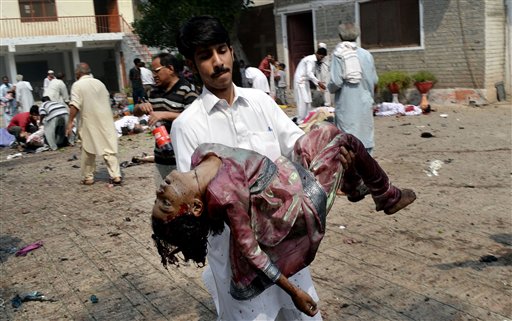(AP) Attack on Pakistani church kills over 60 people
By RIAZ KHAN
Associated Press
PESHAWAR, Pakistan
A pair of suicide bombers detonated their explosives outside a historic church in northwestern Pakistan on Sunday, killing over 60 people in the deadliest-ever attack on the country’s Christian minority, officials said.
The bombing in Peshawar, which wounded another 120 people, underlines the threat posed by Islamic extremists as the government seeks a peace deal with domestic Taliban militants. It will likely intensify criticism from those who believe that negotiating peace with militants is a mistake.
The attack occurred as hundreds of worshippers were coming out of the church in the city’s Kohati Gate district after services to get a free meal of rice offered on the front lawn, said a top government administrator, Sahibzada Anees.
Survivors wailed and hugged each other in the wake of the blasts. The white walls of the All Saints Church were pockmarked with holes caused by ball bearings or other metal objects contained in the bombs to cause maximum damage. Blood stained the floor and was splashed on the walls. Plates filled with rice were scattered across the ground.
The attack was carried out by a pair of suicide bombers who detonated their explosives almost simultaneously, said police officer Shafqat Malik. Authorities found their body parts and were trying to determine their age, he said.
The blasts killed over 60 people and wounded another 120, said Arshad Javed, the top health official at the hospital in Peshawar where the victims were being treated. The dead included several women and children, said Sher Ali Khan, another doctor at the hospital.
The number of casualties from the blasts was so high that the hospital was running out of caskets for the dead and beds for the wounded, said Mian Iftikhar Hussain, a former information minister of surrounding Khyber Pakhtunkhwa province who was on the scene.
Tariq’s father was killed by the blasts, he said.
No one has claimed responsibility for the attack, but suspicion will likely fall on one of the country’s many Islamic militant groups. Islamic militants have been blamed for previous attacks on the Muslim country’s Christian minority, as well as Muslim groups they consider heretics.
The bishop in Peshawar, Sarfarz Hemphray, announced a three-day mourning period and blamed the government and security agencies for failing to protect the country’s Christians.
Islamic militants have carried out dozens of attacks across the country since Pakistani Prime Minister Nawaz Sharif took office in June, even though he has made clear that he believes a peace deal with one of the largest groups, the Pakistani Taliban, is the best way to tamp down violence in the country.
Pakistan’s major political parties endorsed Sharif’s call for negotiations earlier this month. But the Taliban have said the government must release militant prisoners and begin pulling troops out of the northwest tribal region that serves as their sanctuary before they will begin talks.
Sharif condemned the church attack in a statement sent to reporters, saying, “the terrorists have no religion and targeting innocent people is against the teachings of Islam and all religions.”
The U.S. has repeatedly demanded that Pakistan take stronger action against Islamic militants in the country, especially members of the Afghan Taliban who use the nation as a base to carry out cross-border attacks on American troops in Afghanistan.
The U.S. has targeted Taliban militants and their allies in Pakistan’s tribal region using missiles fired from unmanned drones. The latest attack came Sunday when missiles hit a pair of compounds located next to each other in the North Waziristan tribal area, killing six suspected militants, said Pakistani intelligence officials, speaking on condition of anonymity because they were not authorized to talk to the media.
Pakistani officials regularly decry the drone attacks as a violation of the country’s sovereignty, but the government is known to have secretly supported some of the strikes in the past, especially ones that have targeted Pakistani Taliban militants at war with the state.
The Pakistani and Afghan Taliban are allies but have focused their fight on opposite sides of the border.
____
Associated Press writers Zarar Khan and Asif Shahzad in Islamabad and Rasool Dawar in Peshawar contributed to this report.

COMMENTS
Please let us know if you're having issues with commenting.